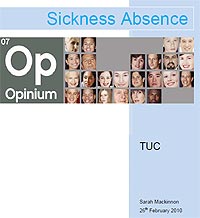 |
|
Public Sectors Workers More Likely To Work When Ill
 New TUC research released last week smashes the myth that public servants are always on the lookout for an excuse to pull a 'sickie' and questions Government claims that there are easy savings to be had from cracking down on absence in the public sector. New TUC research released last week smashes the myth that public servants are always on the lookout for an excuse to pull a 'sickie' and questions Government claims that there are easy savings to be had from cracking down on absence in the public sector.
Public sector workers are more likely than private sector colleagues to work when too ill to do so and less likely than private sector staff to take a 'sickie' - a short period off sick - according to a new TUC report The Truth About Sickness Absence.
While public sector workers take longer periods off work on absence, many work in stressful and dangerous public sector jobs that can cause injury. Private sector workers are much more likely to work for employers who are quick to sack people with genuine health problems rather than help them return to work.
A new TUC poll found that:
- Within the last month, more than one in five public sector workers have been to work when they were really too ill to do so (21 per cent).
- A further 41 per cent (compared to 36 per cent of private sector workers) have gone into work poorly when they should have stayed off sick within the last year, though not in the last month.
- Only one in ten public sector workers (11 per cent) have never been to work when they were too ill to go.
- One in three public sector workers cited their reason for going into work when unwell was 'people depend on the job I do and I didn't want to let them down' (33 per cent).
- Others were concerned about the impact their absence would have on colleagues: 'I didn't want to give my colleagues extra work' (18 per cent of public sector workers compared with 12 per cent of private sector workers said this was the case).
The regular CBI/AXA absence surveys also back this up and reveal public sector staff are less likely to take absences of one or a few days - how 'sickies' are traditionally defined - than in the private sector. The majority of short-term absence is in the private sector (69 per cent of private sector absence is short-term) but only around 50 per cent of public sector absence is short-term.
Public sector employers are more likely to be supportive of those with long-term illnesses and have good sickness policies in place, says the TUC report.
Around one in eight (12 per cent) of public sector employees told the TUC survey they were concerned about losing pay by not going into work, whereas this was the second biggest concern for private sector workers with twice the amount, around one in four (23 per cent), saying 'I would have lost pay and I can't afford to'.
 TUC General Secretary Brendan Barber said: TUC General Secretary Brendan Barber said:
"People often talk about a 'sicknote culture' in the UK. Many seem to think that public sector workers are particularly guilty of taking time off work when they are not really unwell.
The truth is we are really a nation of mucus troopers, where workers - particularly those in the public sector - routinely go into work when they are too ill and should be at home. And they do this - not because they are afraid of their boss - but because they know they do vital jobs in over-stretched workplaces.
Absence rates have been falling over time in the public and private sectors. It is a myth that there are big, quick and easy savings from new policies that assume that sickness absence is mostly skiving. Of course positive sickness absence policies are important in the public and private sectors. But there is most to gain from tackling the causes of absence, particularly stress, and helping people return to work.
Employers who use the carrot approach of engaging with their workforce in a positive way will reap the benefits, while those who use the stick approach will find it backfires on them."
The TUC report together with the full poll results documents are available from the E-Library Database using search word 'sick'.
Source: TUC
|
|
|
Designed, Hosted and Maintained by Union Safety Services
|



 TUC General Secretary Brendan Barber said:
TUC General Secretary Brendan Barber said: